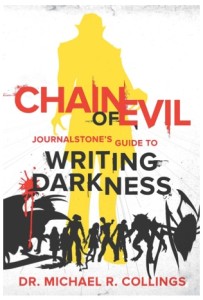 I sat down with a .pdf copy of this book, annotation functions turned on, intending to highlight the tidbits I imagined I’d glean from Dr. Collings. Collings is, after all, a master of the horror genre as novelist, as commentator, as poet, and of course as teacher. This is an unusual combination of excellences; I’m working on two short stories in the horror space right now, and I thought I’d winnow out an applicable tip or two.
I sat down with a .pdf copy of this book, annotation functions turned on, intending to highlight the tidbits I imagined I’d glean from Dr. Collings. Collings is, after all, a master of the horror genre as novelist, as commentator, as poet, and of course as teacher. This is an unusual combination of excellences; I’m working on two short stories in the horror space right now, and I thought I’d winnow out an applicable tip or two.
So now–and I’d show you this, but it would be too much like giving away spoilers–my whole copy is highlighted in yellow. Okay, that’s hyperbole. Really, I’ve only highlighted about a quarter of the text. There were, in fact, one or two things I already knew.
Chain of Evil’s subtitle, Journalstone’s Guide to Writing Darkness, should be understood expansively and taken seriously. This book contains: essays focused on the mechanics of writing, including laser-focused advice on such specific subjects as semicolons, adverbs, and ellipses; meditations on staple motifs of speculative fiction (vampires, werewolves, apocalypses); reflections on reasons to write horror in the first place; analyses connecting horror to pre-modern metaphysics and tracing the changing role of, e.g., ghosts, as things have fallen apart and the center has not held; discussions of horror and Mormons (!); and actual poetry (!!). And more.
It even, to my surprise and delight, quotes me.
From the perspective of the first step on the journey of reading Chain of Evil, not all of the essay’s titles seem equally promising as tools or lore about “writing darkness”; from the perspective of the end of the road, each essay strikes me as indispensable. Dr. Collings wants to teach us to write literature that matters, because it grapples with the blackness behind the backs of our eyeballs and in the depths of our hearts, and to do that he sets forth a guide that is purposeful and oriented from the highest perspective, is detailed and tactical in its nuts and bolts specifics, and is replete with concrete examples.
Essential, topical, meaningful, and urgent. If you’re a writer or reader of horror fiction, get this book as soon as you can.

 Follow
Follow





































